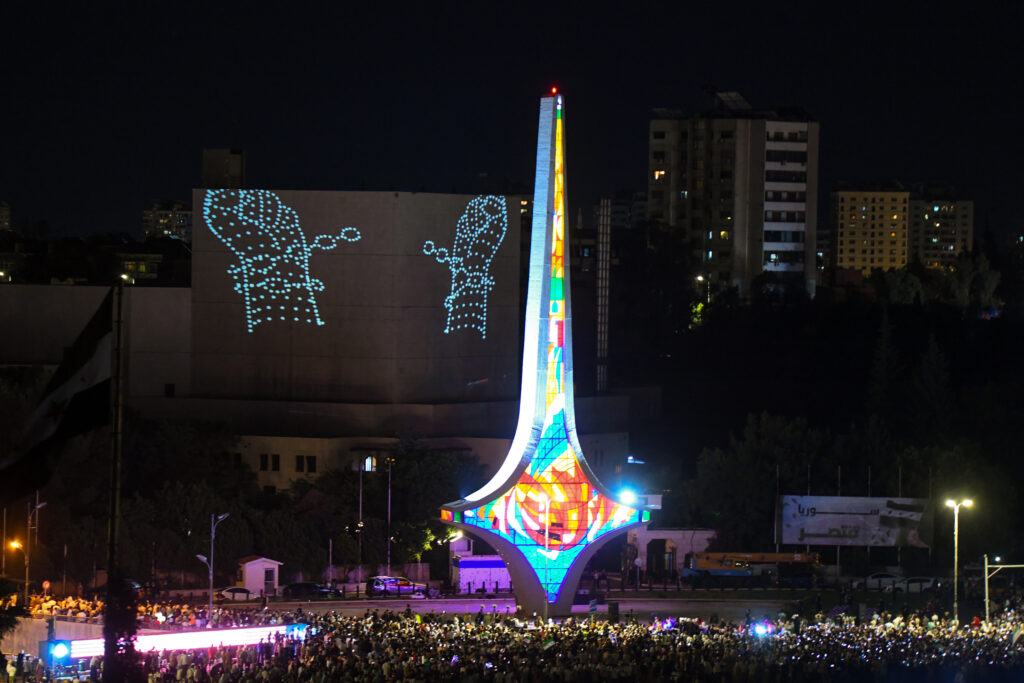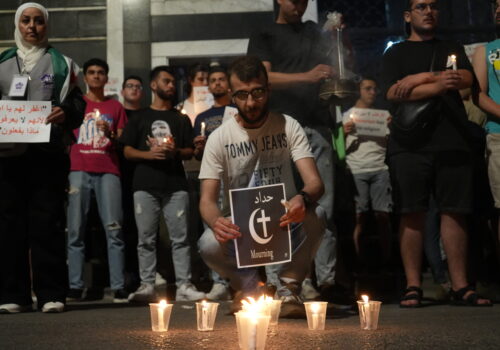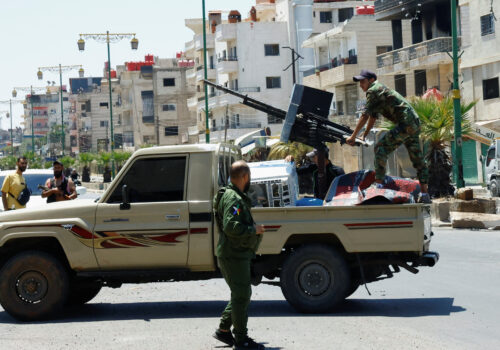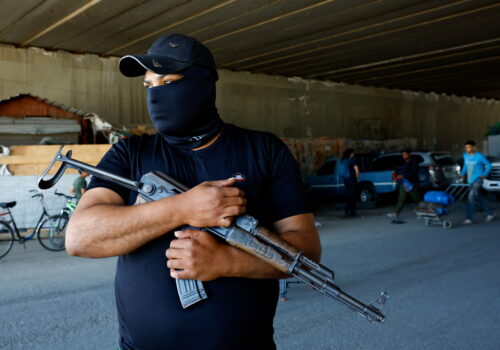It’s been nearly nine months since Syrian dictator Bashar al-Assad fled his country for Russia, ending his family’s decadeslong rule. Since taking power in a sweeping offensive last December, the new government led by former rebel leader Ahmad al-Sharaa has faced the immense challenges of rebuilding the country and managing tensions among the country’s disparate ethnic and religious groups in the wake of violence targeting Syria’s Druze and Alawite minorities.
How much progress has Sharaa’s administration made in its aims to revive the economy, centralize the government, and ensure the country’s security? Several of our Middle East experts recently visited Damascus, and they share their on-the-ground insights below.
Click to jump to an expert analysis:
Ibrahim Al-Assil: The mood is cautious but forward-looking
Alex Plitsas: Syria should join the Global Coalition to Defeat ISIS
Gershom Sacks: Transforming Syria into a positive force
The mood is cautious but forward-looking
Landing in Damascus to examine the transition and engage with local actors and government officials, the city felt both determined and precarious. Ministries gutted by years of war and sanctions are being rebuilt almost from the ground up. Technocrats and private-sector veterans have stepped forward to “volunteer for the state,” working long hours with scarce resources to restore basic services and credibility. Yet the picture is more complex, and the challenges go well beyond a hollowed-out bureaucracy: fragile legitimacy, violent domestic episodes, and intricate regional dynamics present deep and serious obstacles.
The officials we spoke with underscored the stakes: stability, they said, is essential to containing the Islamic State of Iraq and al-Sham (ISIS) and preventing Syria’s fragmentation, yet it remains undermined by foreign powers backing different factions. Negotiations with the Kurdish-led Syrian Democratic Forces remain tense as the government seeks full integration. On the Kurdish side, distrust of Damascus’s willingness to share power and guarantee security runs deep, and Israeli strikes further heighten a sense of vulnerability. Even as Syrian officials emphasize inclusivity, the conversations in the streets reveal lingering divisions, with minorities voicing fear for their future after this year’s bloodshed in the coastal region and Sweida.
Economic efforts reflect this tension between ambition and constraint. The Ministry of Economy is courting investors, drafting an investment map, and pursuing both microfinance and capacity-building initiatives alongside mega-projects. Officials candidly acknowledge the enduring effects of sanctions while touting asset recovery and public-private partnerships. Yet transparency concerns, repeatedly raised by investors and entrepreneurs, remain a significant obstacle to attracting sustainable investment.
The mood is cautious but forward-looking. Syria’s transition is neither orderly nor secure, but it represents a rare window where institutional rebuilding and political recalibration are actively underway, carrying opportunities and risks in equal measure.
—Ibrahim Al-Assil is the Syria Project lead for the Atlantic Council’s Middle East programs.
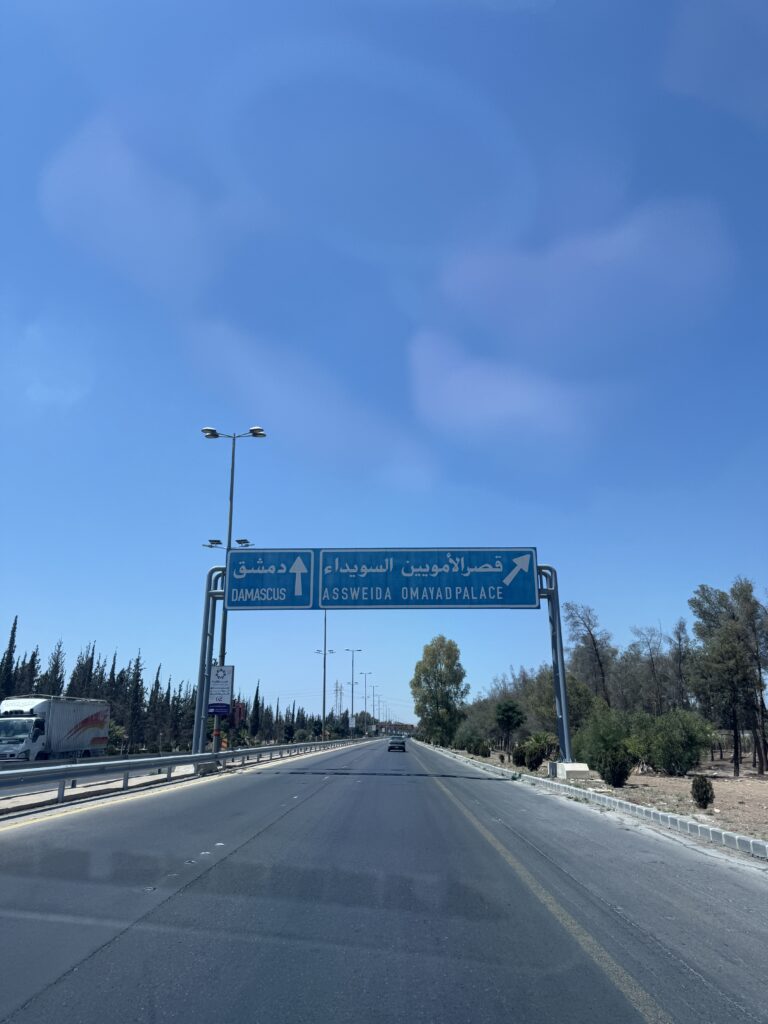
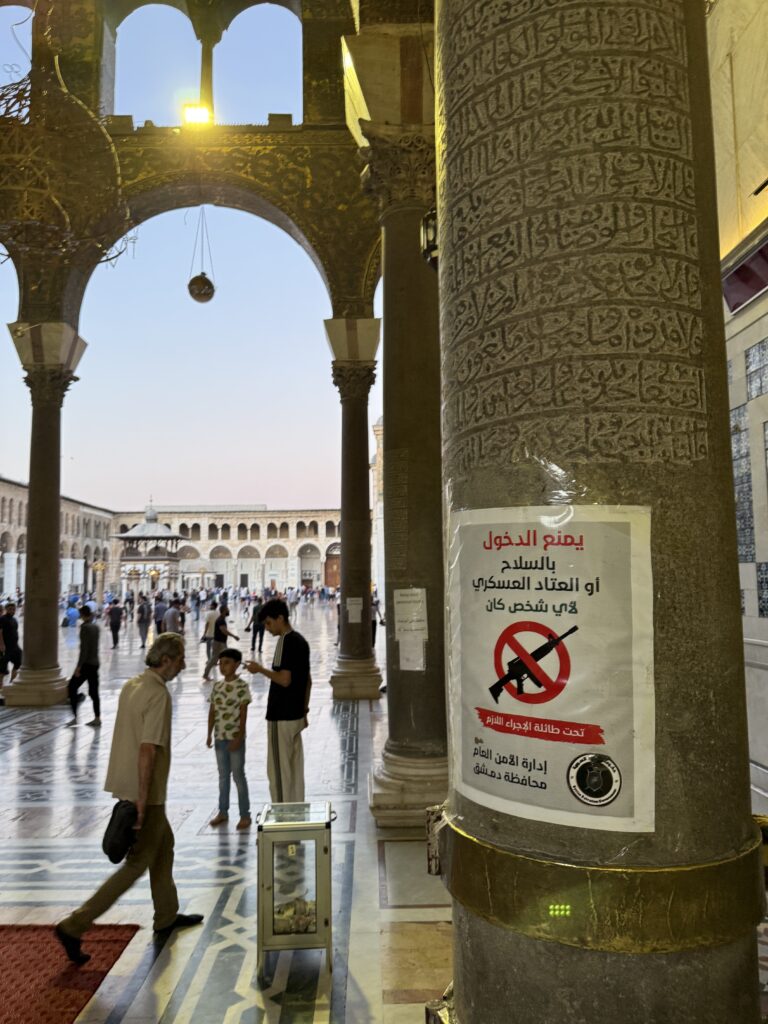
Sharaa’s most urgent challenge is unifying the country’s religious and ethnic minorities
Last December, I watched from Doha as the Syrian regime fell. I could not have imagined then that less than a year later I’d be in Damascus with Atlantic Council colleagues meeting with ministers of the Sharaa government. The joy of Assad fleeing Syria remains palpable across the population. And there is a challenging but real pathway for Syria to emerge from its current economic ruin, political instability, and ongoing security threats, including from ISIS.
But the euphoria over Assad’s demise has given way to the sobering realities associated with rebuilding a deeply fractured state. The most urgent challenge facing Sharaa’s government is how to unify Syria’s diverse and varying minority groups.
Damascus must meaningfully integrate and bring together the many factions and portions of the populations not inclined to be part of a broader Syrian state fabric—especially one that is centralized and run by Sharaa and his former compatriots from the jihadist group Hayat Tahrir al-Sham (HTS). Druze in the south, Alawites in the west, Kurds in the northeast, and Christians throughout the country—these are among the minorities ranging from skeptical to hostile of the new Syrian government, unconvinced that the government will truly protect their rights and ensure them an equal voice.
Damascus will need to either cajole them to accept a centralized government or begrudgingly accede to a more federated model. Time is not on the government’s side. The longer the situation lingers without resolution, the greater the likelihood of sustained sectarian violence—which would undermine Sharaa’s goal to turn the page on Syria’s civil war and reintegrate the country into the broader Arab and global communities.
—Jonathan Panikoff is the director of the Scowcroft Middle East Security Initiative in the Middle East Program.
Syria should join the Global Coalition to Defeat ISIS
I was in Damascus last week and met with senior Syrian ministers. During my visit, I witnessed firsthand a secular culture where minority sects openly practiced their faiths, communities coexisted peacefully, and women were treated with dignity—free to dress as they chose without elements of forced religious observance. This environment of tolerance is an important foundation upon which the new Syrian government can build as it seeks legitimacy at home and abroad.
What Syria should do next is join the Global Coalition to Defeat ISIS, a nearly ninety-member strong group committed to combating the terrorist organization. By joining the Global Coalition to Defeat ISIS, Syria could help reinforce a commitment to pluralism by decisively confronting extremist elements that threaten its stability. ISIS cells remain active in parts of the country, undermining security and preventing displaced Syrians from returning home. Cooperation with the coalition would bring access to intelligence, training, and coordination that could hasten ISIS’s defeat.
Stability is also essential for the future of Syria’s economy. Without improved security, foreign direct investment will not flow into the country at the scale required for meaningful reconstruction. A credible counterterrorism partnership would not enhance the country’s safety while signaling to investors that Syria is ready to re-engage economically.
Moreover, coalition membership could increase trust with Israel by demonstrating that Damascus is serious about countering groups that destabilize the region, while also opening the door to greater partnership with the United States. At the same time, collaboration against ISIS alongside the Druze community and Syrian Democratic Forces would strengthen the government’s hand in pursuing peaceful unification and inclusive governance.
What I witnessed in Damascus left me cautiously optimistic. By embracing coalition membership, Syria could demonstrate its secular and tolerant character, restore stability, attract investment, build regional trust, and unite its people under a shared vision for the future.
—Alex Plitsas is a nonresident senior fellow with the Middle East Programs’ Scowcroft Middle East Security Initiative and leads the Initiative’s Counterterrorism Project.
Transforming Syria into a positive force
Syria under Sharaa has an opportunity to transform the Middle East, if he and the West can seize it. The new government has expressed a desire for regional peace and security and alignment with the West on core issues. It wants to prevent Iran from using Syria as a platform for chaos, dismantle Hezbollah’s supply networks, and challenge remaining ISIS cells. It is pursuing a security agreement with Israel that could bring calm to its southern border and one day, under the right conditions, normalized relations. This new Syria is within reach but requires both bold leadership and for the West to establish itself as Syria’s preferred partner to help increase the odds of Sharaa’s success.
To increase these odds, the United States and its partners—and Israel, once a security deal is reached—should take steps to increase security, military, and counterterrorism cooperation. Sharaa will need help countering threats that could drive instability, in particular ISIS activities and ongoing coordination between Iran and Hezbollah. This would reinforce Syria’s internal security, prevent broader instability in the Levant, especially in Lebanon, and bolster Sharaa’s legitimacy as he seeks to reunite the country. Perhaps most important, this would give an opportunity for the West to build trust, deconflict, and test Syria’s security apparatus as it anchors its interests in Damascus.
At the same time, Syria’s economy is in desperate need of investment. The West should invest in industries that would help Syria rebuild, including cement, transportation, logistics, and finance. Syria’s partners should look to help sectors that can support the country’s prosperity, such as power plants, renewable energy, desalination, petrochemicals, and advanced technologies. These investments could provide unique opportunities for US companies and support the Syrian economy. The Trump administration’s decision in June to lift sanctions is a good first step, but it’s incumbent on the West to shape this cooperation and anchor its interests in Damascus.
This future is only possible if Syria can establish trust in the international community, better integrate and protect minority communities, and prevent the troubling scenes from Sweida in July from happening again. Damascus should find an appropriate formula for governing the Druze, Kurds, and Alawites, and finalize the security deal with Israel, including the humanitarian corridor into Sweida. Israel should give Sharaa some room to maneuver to finalize the deal by avoiding attacks on regime targets, such as the Ministry of Defense in July and Syrian military personnel. Sharaa and the West have an opportunity to transform Syria into a positive force, with an opening for near-term cooperation and future normalization with Israel. Policymakers should seize this moment while conditions are ripe.
—Gershom Sacks is the deputy director of the N7 Initiative, a partnership between the Atlantic Council and the Jeffrey M. Talpins Foundation dedicated to strengthening cooperation between the United States, Israel, and Arab and Muslim countries.
Further reading
Mon, Aug 25, 2025
Dispatch from Syria’s Christian strongholds: A new government, a full political spectrum
MENASource By
The conditions of Christian communities across the country remain varied, with the opinions of religious and community leaders deeply mixed.
Wed, Jul 30, 2025
After Swaida: How Syria’s periphery is shaping its future
MENASource By Ibrahim Al-Assil
What comes next in Syria will not be determined by battlefield victories or summit declarations, but by the evolving realities on the ground.
Thu, Jul 24, 2025
In a sectarian Syria, the winners should refrain from taking all
MENASource By Marie Forestier
To avoid the complete supremacy of HTS-supporting Sunnis, it is crucial to adopt power-sharing mechanisms ensuring inclusiveness
Image: A drone light show illuminates the sky over Umayyad Square in Damascus, Syria, on July 5, 2025, during celebrations marking the launch of the new visual identity of the Syrian Arab Republic. (Photo by Rami Alsayed/NurPhoto) REUTERS
